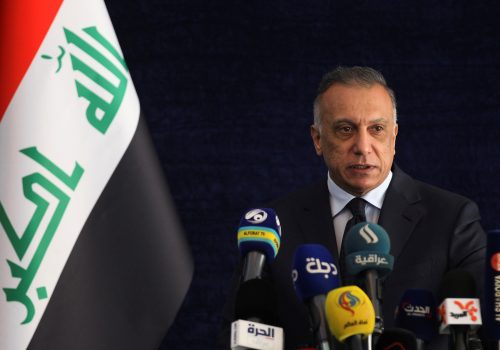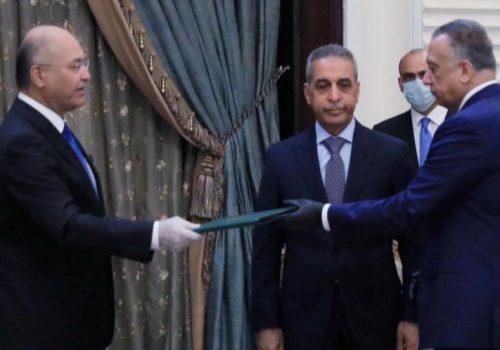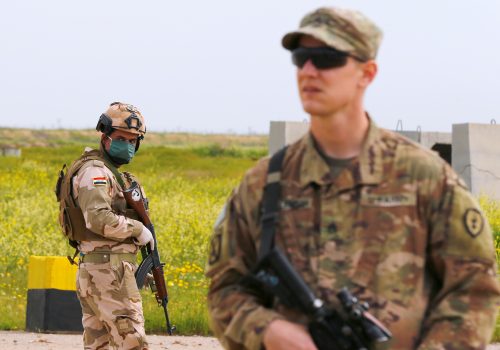Three years after the Caliphate, Iraq’s Christians find little incentive to return
It’s been three years since the guns fell silent in Mosul, the onetime capital of the Islamic State of Iraq and al-Sham (ISIS). With the Caliphate finally pushed out, it seemed the nightmare of extremist rule was finally coming to an end, giving Iraq’s Christian minority a chance to reclaim their homes after years spent sheltering under brutal conditions, fleeing to refugee camps, or taking flight abroad.
Instead, their hopes of rebuilding have diminished even as the threat of the Caliphate has faded. The region’s few remaining Christians find themselves caught between Iran-backed Shia militias and an Iraqi government that, nearly twenty years after the American invasion, is politically paralyzed and still unable to provide basic security and services—let alone protect the country’s embattled minority populations. As a result, most Iraqi Christians are searching for brighter pastures, even if it means forever parting with the land of their ancestors.
“Of the twenty thousand Christians that fled Mosul when ISIS came, only one hundred have returned,” said Reine Hanna, director of the Assyrian Policy Institute. “People can’t work and earn a living among ruins. There’s little incentive to return.”
The country that is now Iraq has been home to various Christian communities for more than two thousand years. Falling mostly outside the Roman Empire, where the Christianity familiar to most Westerners today took its basic shape, Iraqi Christians developed their own unique forms of Christian worship and theology which endure to this day; they draw heavily on ancient liturgical rites, prayers, and customs.
The fortunes of the region’s Christians vacillated with the many empires that rose and fell over the centuries. Prior to the US-led invasion in 2003, the country was home to 1.5 million Christians. But, despite their endurance over the centuries, the subsequent occupation and insurgency proved to be a breaking point. By 2014, shortly before the rise of ISIS, over eight hundred thousand of Iraq’s Christians had fled abroad, with many making new homes in the United States and Western Europe.
The establishment of the ISIS Caliphate drove the few remaining Christians out of the region to avoid living under a regime that gave them an ultimatum: pay a special tax for non-believers or leave or be killed. Nearly all chose to leave to the Kurdish north. While ISIS’ territorial defeat provided an opening for the return of Mosul’s Christians, that hope has quickly faded in the face of the grim state of Iraqi politics. The biggest challenge facing the country are the militias that control the territory formerly occupied by the Caliphate.
Today, the Popular Mobilization Forces (PMF), an umbrella group of various militias—mainly backed by Shia clerics and Iran—that were once seen as integral to the fight against ISIS, are now focused on controlling the areas they liberated. They are also determined to further their own political agenda. The PMF have already been documented committing a number of crimes across Iraq, including looting, revenge killings against Sunni Arabs, and seizure of property.
There is a growing fear that many PMF units will ultimately occupy towns indefinitely, since they have not left the ones they liberated. This is creating a climate where they mete out whatever justice or injustice their militia leaders dictate. Exploiting Iraq’s fractured political and security landscape, PMF units have erected their own system of check points and recruitment offices in towns across the country, giving them an advantage over the domestic security situation. They have even entered politics, helping Iran-backed groups gain even more leverage over Iraqi affairs, such as its economy.
A glaring example of their influence is visible in newly-elected Prime Minister Mustafa al-Kadhimi’s inability to hold them accountable despite having support from Iraq’s different political factions. After ordering the arrest of fourteen members of Kataib Hezbollah—one of the largest Iran-backed militia groups in Iraq—for launching rockets at US targets, the militiamen brazenly drove around the premier’s house in Baghdad’s Green Zone. Ultimately, the apprehended men were placed under the supervision of the security directorate of the PMF, headed by a member of Kataib Hezbollah, who released the militia men shortly afterwards.
The situation is no different in the Nineveh Plains, the one remaining region of Iraq where Christians form a plurality and where a PMF militia, the Babylon Brigade, maintains control over a number of villages.
The Babylon Brigade is part of the group politically allied with the Badr Organization, an Iraqi Shia Islamist political party and military organization that was once headquartered in Iran. The Babylon Brigade touts Rayan Kildani, a local Christian, as its leader, but he is merely seen as a Iran’s token figure in an attempt to broaden the political alliance’s appeal. Kildani enjoys little support from his community or Iraqi Christian clerics and was sanctioned by the US Department of Treasury for human rights abuses. As for the Babylon Brigade itself, the group’s fighters are primarily Shia Arabs, who do not originate from the Nineveh Plain, and Shabak. The latter are a Shia minority seen as close to Iran and have been accused of widespread corruption, intimidation, kidnapping, and extortion.
To add insult to injury, the Babylon Brigades’ political wing took two of the parliamentary seats reserved for Christians in the previous legislative elections, with the heavy backing of Shia votes on the Badr List. This cemented the group’s rule over the area and community.
Posters of Supreme Leader Ayatollah Ali Khamenei have been erected in the area and even a school bearing the name of the Iranian leader’s predecessor was opened. People seen as close to the PMF have begun to construct or purchase properties in the area. The once Christian majority town of Bartella is now majority Shabak, eroding the identity of one of the area’s few remaining Christian towns.
“When you control an area, you’re the [decision-maker] on who gets to return and what rehabilitation looks like,” said Hanna, who has done extensive research on the return of Iraqi Christians in post-ISIS Iraq.
“There’s a general fear that the PMF control the local institutions and it is not safe to return. And [Iraqi Christians] believe there are biases [by] the Shabak community against them,” says Adam Lucente, an Al-Monitor reporter based in Iraq before the COVID-19 pandemic.
It is these fears that have deterred many Iraqi Christians from coming back to their villages. The return rate amongst Christian families in the area is discouragingly low, according to Hanna. “In areas [in the Nineveh Plains] under the Babylon Brigade, the rate of return has almost been negligible—only 7 percent of families have returned.”
“If you go to these villages under [the Babylon Brigade], you will only find just a few old people. No families or youth return,” says Athra Kado, a native resident of Alqosh, a village in the Nineveh Plain.
Zaid Kathawa, an Iraqi Christian also residing in the area concurs. “In Telkef district, Tesqopa, Batnaya and Sharafiya [villages in the Nineveh Plain] most of the people didn’t return. The security situation is in the hands of the militias.”
The militia has also placed a bottleneck on the local economy, which relies on the more prosperous Kurdish north, according to Kathawa. “People who have their own businesses face big problems in transportation of their goods between Erbil and Nineveh and they have to bribe the men at checkpoints despite [that] being illegal.”
Since the PMF units enjoy support from the central government, which uses them as a proxy for its own ineffective governance, Iraqi Christians feel there is little hope in wresting power from the group. “We do not have the ability to fight official forces and these forces are recognized by the Iraqi government,” laments Athra.
In Mosul, the situation is even more dire. The city lies in ruins due to tepid reconstruction efforts under the Iraqi government. Furthermore, international donors have been hesitant to help due to corruption, which has bedeviled international aid programs since the US-led invasion.
Besides the city’s devastated state, there are also fears that an ISIS resurgence is a possibility, which has kept many from returning in a city mixed between religious sects. “We know there are ISIS members who have returned to their homes. We only feel safe amongst each other,” says Zaid. In fact, ISIS has even posted videos of a number of its members slipping back into Iraq.
And, so far, the Iraqi government’s attempts at reconciliation and reconstruction have been mostly cosmetic. Despite Kadhimi visiting Mosul and the Nineveh Plains himself this summer, hailing the region as a “symbol of coexistence,” he made sure to temper reconstruction expectations and hopes of compensation by reminding locals of Iraq’s dire economic situation. Even major clergy members have voiced their doubts in his leadership. The Syriac Orthodox bishop of Mosul blatantly told Kadhimi during the same trip that “We have no confidence in the government” and “Our people have left, Your Excellency.”
Baghdad is also doing little in terms of fostering any sense of justice for victims. The government is merely putting on show trials—some lasting less than twenty minutes—and summarily executing ex-ISIS members without receiving proper testimonials of the crimes perpetrated.
Ultimately, the failure of both the PMF and the Iraqi government to provide meaningful economic and security reforms—let alone reconciliation efforts—might ultimately dash any hopes of Iraq’s Christians from returning. If the next twenty years look no better than the last two decades, there’s little hope that this ancient community will play more than a piecemeal role in the country’s future, assuming they remain inside Iraq at all.
“There is this inherited trauma that it could happen again,” said Athra. “How can people go back when some of your own neighbors perpetrated crimes?”
Paul Gadalla is a former Beirut-based journalist who also worked in communications at the Carnegie Middle East Center in Lebanon. Follow him on Twitter: @BoulosinDC.
Image: Iraqi Christians attend a mass on Christmas Eve at the Grand Immaculate Church in al-Hamdaniya, near Mosul, Iraq, December 24, 2019. REUTERS/Abdullah Rashid


